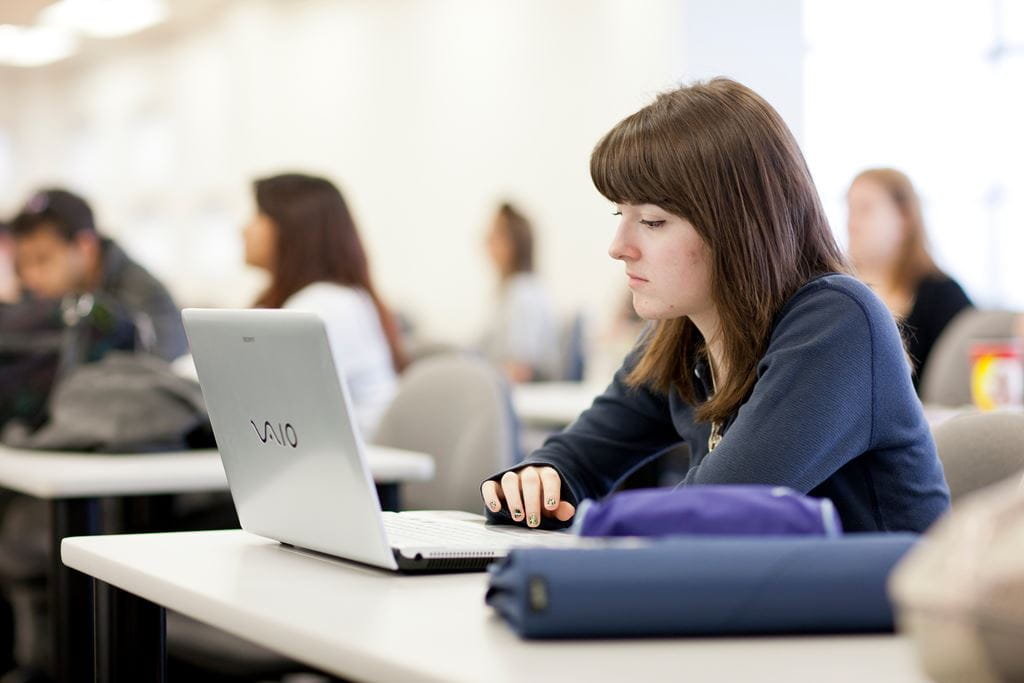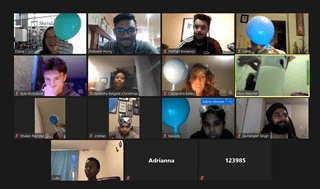
Virtual Internship Program participants enjoy meaningful experience
 by Jon Kuiperij – Sep 11, 2020
by Jon Kuiperij – Sep 11, 2020 When Ina Varghese first realized the COVID-19 pandemic would make it impossible for post-secondary schools to offer traditional internships this summer, she chose to look at the bright side.
“There was nothing any of us could do about it, so I decided I’d try to do some of the things I’d been wanting to do but didn’t have time for during school,” says the Sheridan Information Systems Security degree student. “Things like attending webinars and workshops, learning about things I’m interested in, building my resume and developing skills that were lacking.”
Fortunately, Sheridan administrators and faculty were already hard at work building an innovative program that would enable degree students to check off each of those boxes while completing their internship at the same time. The Virtual Internship Program (VIP), quickly developed by Sheridan’s Career-Integrated Learning (CIL) team in collaboration with the Faculty of Animation, Arts and Design (FAAD) and the Entrepreneurship Discovery and Growth Engine (EDGE) hub, featured three streams of virtual internship opportunities, a 10-week Career-Ready Competency course, various learning modules and a guest speaker series with relevant webinars throughout the program.
“The VIP was a saving grace for me this summer. When I heard about it, it was an instant no-brainer to join." - Azmeer Hussain
“The VIP was a saving grace for me this summer. There weren’t any internship postings, or even the idea of an internship posting in the distant future,” says Azmeer Hussain, who is entering the fourth year of his Bachelor of Mobile Computing program. “When I heard about it, it was an instant no-brainer for me to join.”
Hussain and Varghese were among the 104 students who chose to enter the VIP’s Innovation Accelerator stream, which engaged participants in a facilitated 10-week interdisciplinary group project to develop solutions to pandemic-related challenges faced by one of four community collaborators. Top student proposals were identified by the collaborators and received cash prizes, supported by RBC Future Launch. We caught up with one student from each challenge in the Innovation Accelerator to learn about their experience.
Galvanizing education

Bachelor of Business Administration (Human Resources Management) student Amanda Oreskovic
At first, Amanda Oreskovic considered applying the internship hours she’d already amassed as a fitness center receptionist towards the VIP’s Work stream, since it allowed students who were already midway through an internship to earn the rest of their hours through the completion of online learning modules.
However, the Bachelor of Business Administration (Human Resources Management) student found the opportunity to work with other students and resolve a real-world problem too exciting to pass up. “I felt I could make the most of it and turn it into a great Human Resources recruitment experience that would potentially look really good on my resume,” she says.
Oreskovic led a three-student team tasked with assisting Sheridan’s Galvanizing Education Task Force in its efforts to re-envision and design implementable and innovative ways in which higher-education experiences are delivered. It didn’t take long for her to realize the benefits of working with students from other disciplines.
“Since my classes are so business-oriented, I came into the challenge thinking we should be considering revenue and making decisions from a business perspective,” says Oreskovic, whose teammates were students from Sheridan’s Mobile Computing and Honours Bachelor of Film and Television (BFTV) programs. “It was great to hear other perspectives, and we ended up tailoring a prototype that was about the student experience.”
The team proposed a series of modules that would help acclimate new students to the Sheridan environment, covering such subjects as SLATE (Sheridan’s online learning management system), student services, time management tips, on-campus opportunities and mental health advice.
Improving experiences of young learners
Hussain had a similar learning experience when his group assisted the educational arm of one of the world’s largest technology companies in its efforts to maintain and improve emotional, personal and social connections between educators and young learners during the pandemic.
“The first instinct for myself and one of my Mobile Computing classmates was to make an app, because that’s instantly where our mind goes, and another group member of ours was an Interaction Design student who could design the app,” he says. “But then our fourth group member centered us and pointed out we needed to step back, go bigger picture mode and actually see what our problem was.”
Rather than proposing new technology, the group opted for a simple approach: carving out a window of time for social interaction during online classes. “Virtual learning has removed aspects of the students’ lives like when you get on the bus and ride home with your friends,” Hussain says. “We may not be able to replace that aspect physically, but we can try to simulate it by teachers setting time aside. That way, the kids still get an opportunity to connect with their peers on a social level.”
Enhancing elders’ participation in the arts
BFTV student Jackson Denis had always anticipated he’d spend his internship working in a sound studio, not helping Sheridan’s Centre for Elder Research think of ways to enhance older citizens’ participation in creative and performing arts through the use of innovative technology.
“I thought about putting off my internship but decided I’d rather complete it so that I could continue my studies in the fall,” says Denis, who participated in the VIP from his parents’ Ottawa-area home. “The biggest takeaway for me has been working with others, which is a skill you need working on a film with a crew. It’s also been a good feeling to come up with ideas that can help seniors engage with the arts, because social isolation is a huge issue right now.”
His group pitched a Zoom class as an inclusive way to accommodate older adults who were in long-term care facilities. “Classes could be conducted in the hallway outside their rooms, which wouldn’t be too difficult for staff in those facilities to set up,” notes Denis, who leaned on his audio expertise to address any potential hearing difficulties. “And we suggested art kits could be sent to the participants, which would help ensure the program was more accessible.”
Re-imagining distribution of recovered food

Information Systems Security student Ina Varghese
Varghese’s natural curiosity caused her to pursue a degree in cybersecurity, and it’s also why she was intrigued by the VIP’s Innovation Accelerator. “I’ve always been interested in building on my own thought process and how I think about things,” says Varghese, who began wondering how biological data was stored when she studied bioinformatics in university, prior to coming to Sheridan. “The VIP was an opportunity to do something I’d never have considered doing and to see a whole new way of thinking. It was nice to exercise that part of my brain.”
Tasked with re-imagining how Halton food recovery program Food for Life could deliver food safely, conveniently and accessibly to 24,000 people during the pandemic, Varghese gained an appreciation that advanced technology can’t always provide an ideal solution. “We really had to consider the technological limitations of the demographic we were working with. Sometimes you need to meet people where they’re at,” Varghese says of her team’s idea to install mobile grocery stores at highly-frequented transit terminals, complemented by the placement of vending machines at stops that were more spatially constrained. “This challenge really helped me take a step back, to gain insights into other experiences and how people navigate the world. That helps you become more inclusive in your thinking.”
Opportunity to make a difference
Whether they helped resolve challenges faced by the elderly, young learners, post-secondary educators or a local charity, the four Innovation Accelerator participants all found satisfaction in working on something extremely meaningful during COVID-19.
“I’d always prefer a problem like this in which I know I can affect someone in a positive way, rather than sitting behind a computer and making meaningless changes to code all day,” says Hussain. Adds Varghese: “I’m glad to have been a part of it, because it’s not something I’d normally have thought of doing. Hopefully, the research we did helped spark ideas for Food for Life, and they can run with those ideas in whichever way they like.”
The students also see value in Sheridan continuing to provide virtual internship options after the pandemic has ended. “I think this VIP could definitely be something utilized in the future to come up with innovative ideas, not only for Sheridan College but also for community partners,” says Oreskovic. “We’ve been provided with a really interesting perspective.”
Pictured at top of page: Student working on a laptop. Photo provided by Sheridan College.
Written by: Jon Kuiperij, Marketing Copy/Content Writer at Sheridan
Media Contact
For media inquiries, contact Sheridan’s Communications and Public Relations team.





